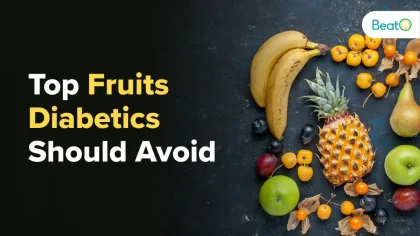Managing diabetes is a challenging task and controlling blood sugar levels for people with diabetes involves making smart food choices. However, people usually have the opinion that some fruits should be avoided in diabetic patients’ diets because of their high sugar content or high glycemic index (GI). But is it so? Check out this list of fruits to avoid in diabetes. Yes, it is true that fruits have sugar content, but don’t worry, there are certain fruits that can be added to the diabetic food plan.
Also read: 11 Best Fruits For Diabetic Patients You Must Know About
List of Fruits To Avoid In Diabetes
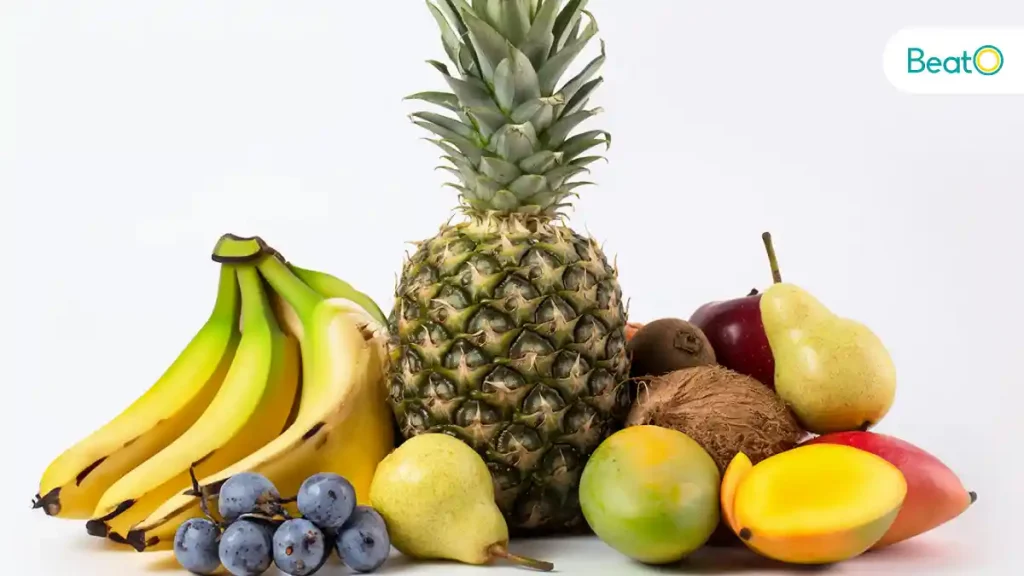
Here is a list of fruits to avoid if you have diabetes, along with reasons to avoid them and alternative options to choose from.
| S.no. | Fruits | Reasons to Avoid | Alternative Choices | GI Level (Approx.) |
|---|---|---|---|---|
| 1. | Watermelon | High Glycemic Index (GI) | Berries, Green Apple | 72 |
| 2. | Mango | High Sugar Content | Berries, Citrus Fruits | 51 |
| 3. | Banana | High in Carbohydrates | Berries, Green Apple | 51 to 56 |
| 4. | Grapes | High Sugar Content | Berries, Citrus Fruits | 53 |
| 5. | Pineapple | High Sugar Content | Kiwi, Papaya, & Berries | 51 to 73 |
| 6. | Canned Fruits | Added Sugars, Syrups | Fresh Fruits | 50 to 65 |
| 7. | Dry Fruits | Concentrated Sugars | Fresh Fruit in Moderation | 50 to 60 |
Note: These fruits have high sugar content: Bananas, Dates, Mangoes and Pineapple.
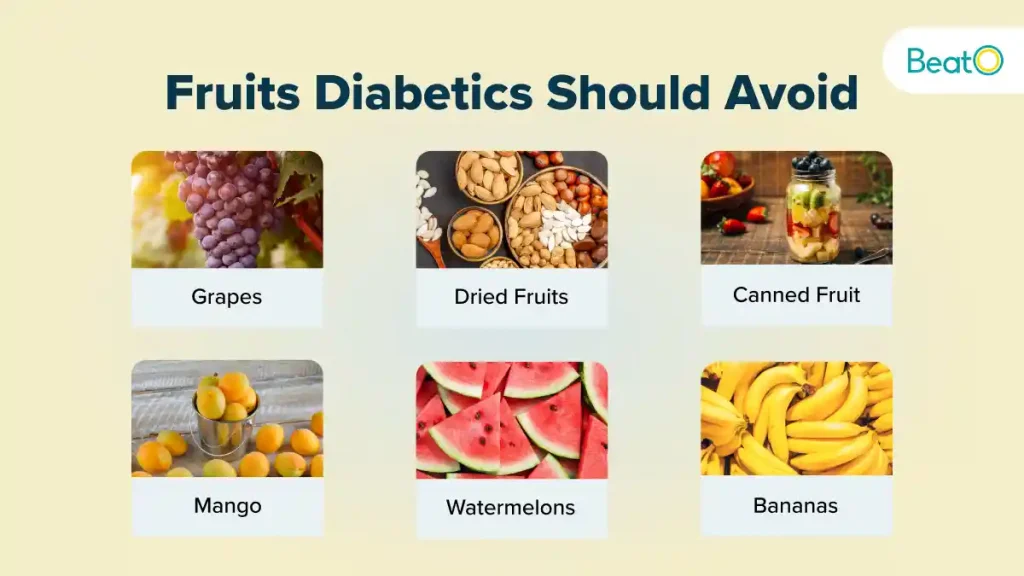
Watermelon
We all love to eat juicy, refreshing, and hydrating fruits in summer, but watermelon is not the best option for individuals with diabetes. It has a high glycemic index, which indicates that it can quickly increase blood sugar levels. You can lessen its effect on blood sugar by consuming it in moderation and combining it with protein or healthy fats.
Mango
Mangoes are delicious, tropical, and perfectly suited for summer fruit. However, despite their exquisite sweetness, they are loaded with high natural sugar content. It is advisable to consume them in moderation and pay attention to portion sizes to prevent blood sugar increases.
Banana
Bananas have a high sugar content and are among the fruits to avoid in diabetes. Although bananas are a rich source of fibre and potassium, they have comparatively high amounts of carbohydrates. Moreover, to help balance blood sugar levels, use smaller bananas.
Also read: Best Weight Loss Drinks To Shred Down Inches Naturally
Grapes
Were you aware? Grapes can elevate blood sugar levels due to their sweetness and natural sugar content. Pick smaller types, such as black or red grapes, and consume them sparingly.
Pineapple
This sweet fruit has a greater natural sugar content because it is juicy and tropical. Moreover, pineapple must be best enjoyed in moderation to control blood sugar levels.
Canned Fruits
Canned fruits are loaded with additional sugar syrups, which can significantly increase the blood sugar levels of the individuals and must be avoided. Moreover, it’s better to choose fresh fruits instead of canned fruits or the ones with no added sugars.
Dry Fruits
Did you know that dry fruits lose moisture and have a concentrated sugar content? They may also significantly increase blood sugar. Moreover, if you like munching on dry fruits, eat them in moderation along with protein or good fats to help slow down the absorption of sugar.
Also read: Diabetic Diet Chart: A Complete Guide To Control Diabetes
List of Fruits To Eat In Diabetes
| S.No. | Fruits | GI Level (Approx.) |
|---|---|---|
| 1. | Green Apple | 39 (medium) |
| 2. | Orange | 33 to 51 |
| 3. | Kiwi | 49-52 |
| 4. | Papaya | 60 |
| 5. | Peach | 42 |
| 6. | Strawberry | 41 |
| 7. | Jamun (Black Plum) | 25 |
| 8. | Pear | 43 |
| 9. | Plum | 40 |
| 10. | Guava | 12-24 |
Green Apple
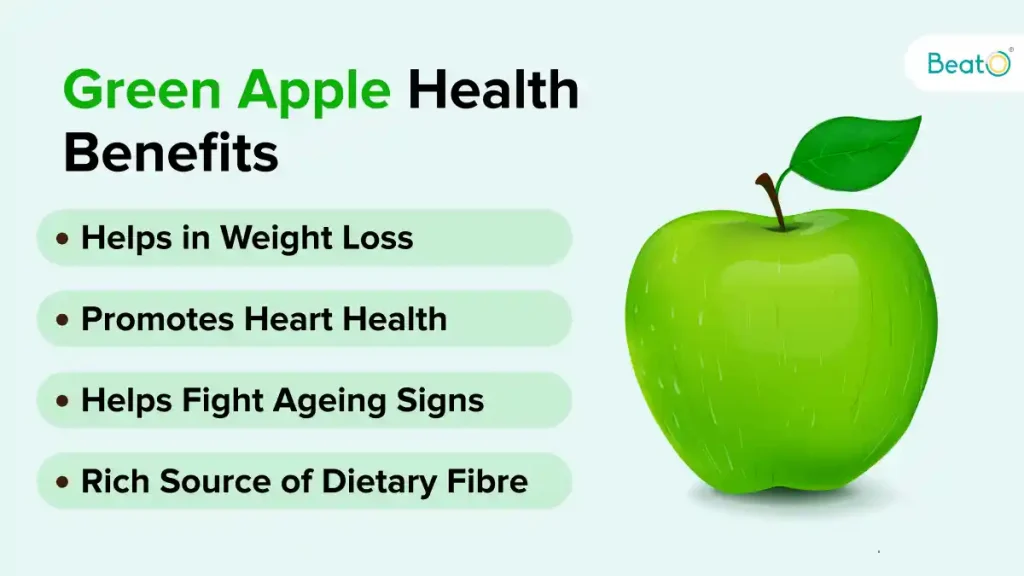
Apples contain soluble fibre and are also rich in Vitamin C. Cut apples and sprinkle with cinnamon powder for extra flavour. Cinnamon helps control cholesterol. Did you know: The skin of the apple is the most nutritious part, so don’t peel it away.
Papaya

Papaya is known to be rich in antioxidants. In addition, it can also help decrease obesity. It flushes out toxins from the body, leading to healthy skin and hair. There are numerous health benefits of eating papaya, such as promoting better digestion, lowering blood pressure, lowering the risk of diabetes, cancer, and heart disease, and enhancing wound healing in diabetics.
Jamun or Black Plum
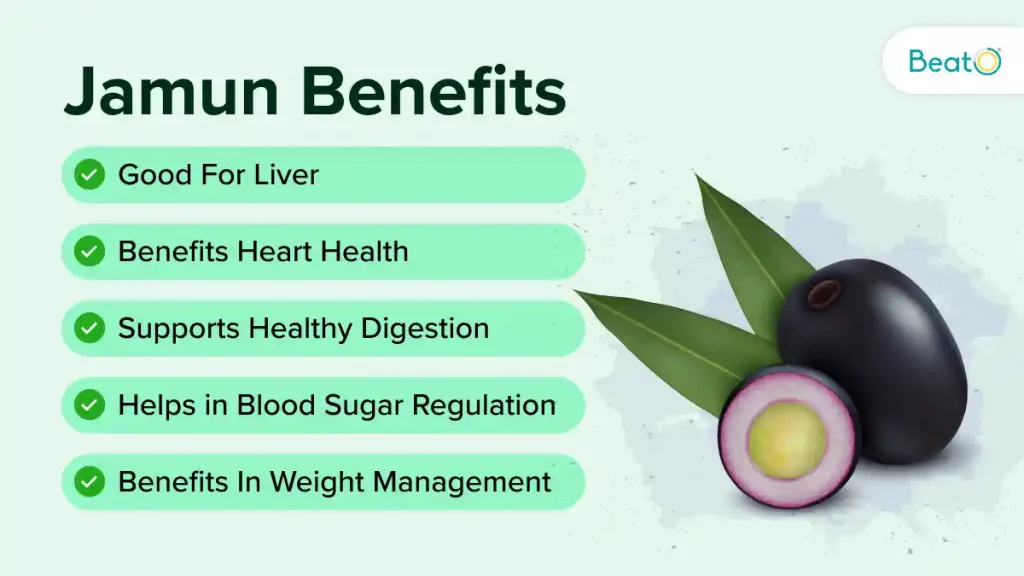
Jamun, often referred to as black plum or Indian blackberry, is regarded as one of the healthiest fruits for those with diabetes. Additionally, eating jamun has been demonstrated to enhance insulin secretion, making it a suitable fruit choice for people with diabetes.
Guavas
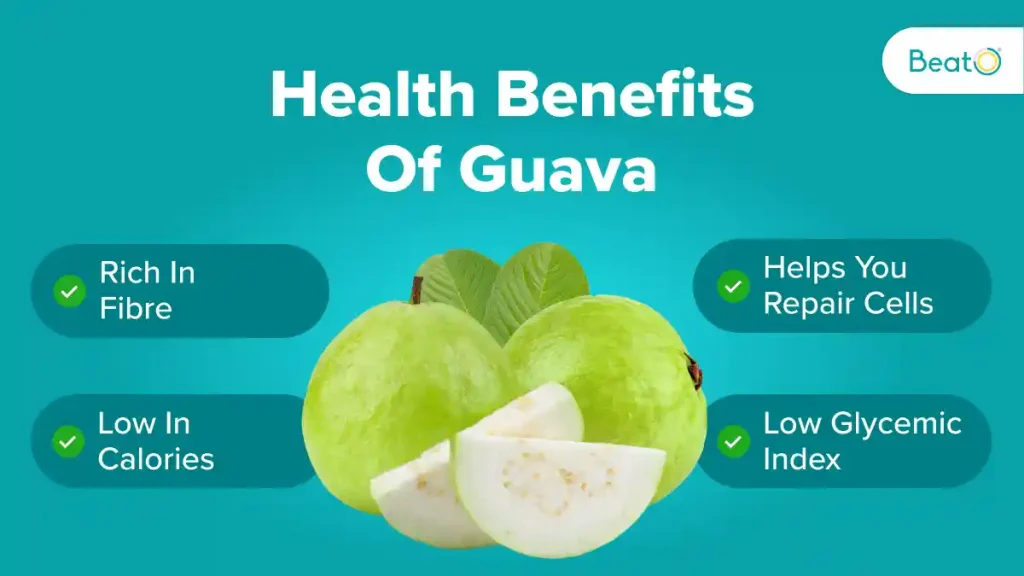
Guavas are rich in fibre and help improve overall blood circulation. They are among the best sources of vitamin C, which is beneficial to those with diabetes. In addition, guavas provide energy and control blood sugar levels.
Cherry
Cherries are known to reduce blood sugar and boost insulin. But this should only be in limited consumption. Moreover, cherries are rich in minerals, vitamins and antioxidants, which offers several health benefits.
Kiwi

Kiwi is a low-glycemic fruit with a high fibre content that aids in blood sugar regulation. In addition, Kiwi has a GI of 49–52, which indicates that it takes longer to reach the bloodstream and does not turn into glucose quickly.
Apart from the above-mentioned, Jamun is also an excellent option to incorporate into your diabetic diet. Regular consumption of Jamun helps decrease blood sugar levels and is known to enhance insulin activity significantly.
Also read: 10 Incredible Celery Juice Benefits You Need To Know
Important Tip: Always consume any of the above-mentioned fruits at least 1-1.5 hours post-meals. Eating fruits, preferably in the morning, is also advisable. It is also a good option to choose whole fruits rather than fruit juices. Follow these fruits to avoid in diabetes list to maintain your blood sugar level. Apart from keeping a check on your diet, it is essential to monitor your blood glucose levels regularly.
Disclaimer: The content of this article is compiled information from generic and public sources. It is in no way a substitute, suggestion, or advice for a qualified medical opinion. Always consult a specialist or your own doctor for more information. BeatoApp does not claim responsibility for this information.
Find the bestDiabetologistsvia BeatO & make an appointment online instantly! Also, keep monitoring your glucose levels with advancedglucometer. Book now virtual consultation and get personalised guidance and diabetes care.

